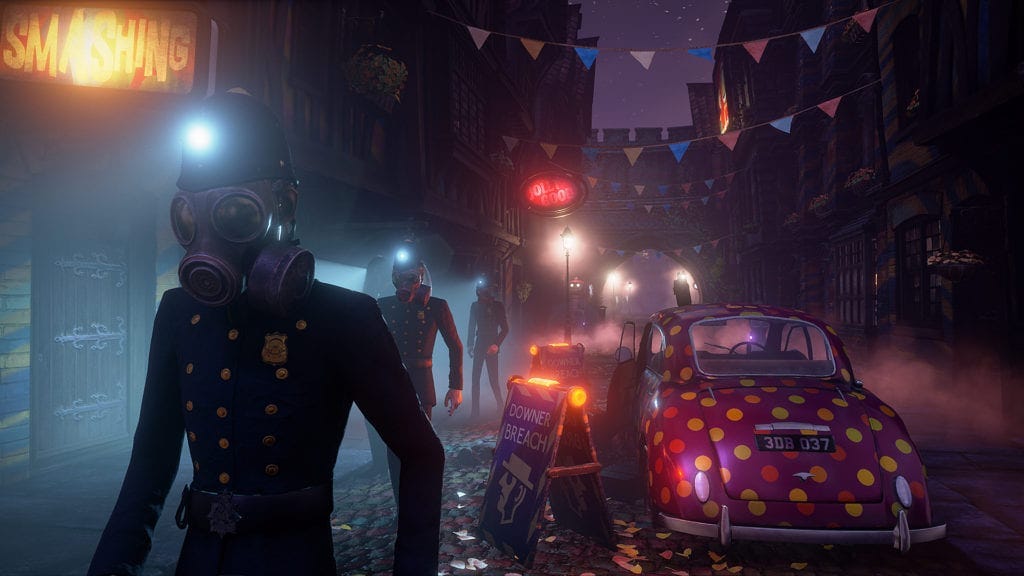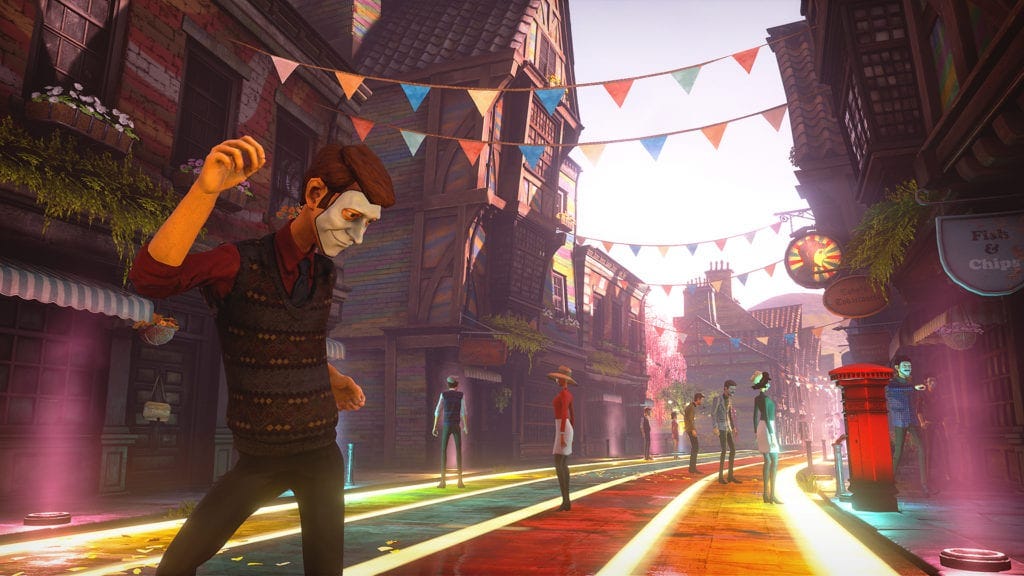We Fine Few | Review
In the penultimate act of Henry V, Shakespeare's titular king is preparing to lead his troops into battle. They are on the eve of war and are not confident they can route their foe. Henry secures the confidence of his men, saying "We few, we happy few, we band of brothers;/ For he today that sheds his blood with me/ Shall be my brother." He goes on to mock the "gentlemen in England now a-bed" who "Shall think themselves accurs'd they were not here, And hold their manhoods cheap" because they weren't part of the war.
This is the passage from which the new game from Compulsion Games derives its name. The protagonist, Arthur, would be much more at home with the English now abed than he ever would be on the battlefield with King Henry V. Arthur, like Shakespeare's Falstaff, is a lovable coward in over his head.
What Made Us Happy
The fact that our hero has a personality at all is enough to set We Happy Few's Arthur apart from the nameless, voiceless protagonists who populate most games. But the fact that he is a coward, not a gruff, jaded, rough and tumble, gun-expert is the first way We Happy Few establishes itself as not different but unique.
Arthur lives in a fictionalized version of the past in which there was no plan to unite Europe after World War 2. As a consequence of this inaction, war broke out again in 1943, and the English were routed by the Germans tanks. As reparations for the war, the English were forced to make some horrible decisions about the future of their own country.

Now, 25 years later, Arthur and his coworkers live in a sort of Austin-Powers-goes-goth version of 1960s England. Civilization has divided into a strict caste system. Judging by items that populate the game, all trade into and out of the United Kingdom has broken down. What's most noteworthy, however, is the pill called Joy.
Characters in We Happy Few take Joy to try and forget the terrible things they've done in the past. Bad decisions they've made, regrets they hold onto, embarrassing stories they'd sooner forget. If it brings them down, Joy can put it behind you. But what started as a way to suppress the consequences of the war became an anesthetic to the world. When the game begins, some citizens have found that Joy isn't doing it for them anymore. No matter how much they take, they can't forget.
As the premise for a game, you could do a lot worse than We Happy Few. The style and aesthetic of the game is fun. And too many video games these days get things wrong because they're not able to deliver an enjoyable experience. But in trying to deliver on the promise of that plot, the cracks on We Happy Few start to show. It is clear that the developers were worried that the excellent game they had wasn't good enough.
A Few Places for Improvement
We Happy Few has all the recognizable hallmarks of a modern video game. It's a first-person genre RPG with a crafting system and a skill tree. It's a narrative driven game within an open-world that is procedurally generated as you move through it. You can pull any of these phrases off of any of the most popular games on Steam right now. But pack them all into a game about considering your actions rather than going with the crowd, and it starts to feel bloated.
This bloat is palpable. As We Happy Few pulls itself across the screen, it drags all the internal components along with it. The load screens are unbearably long. And they're not even confined to loading up each level. Because the game is creating the world in real time, it's possible that the game will stop to load in the middle of actual gameplay.
Not to knock the procedural generation. A procedurally generated survival horror RPG is the idea that sold We Happy Few to Kickstarter backers. But the narrative angle on the game was not added in until early access players thought that the game was missing something. And level design done on the fly by a computer isn't the best way to prop up the plot of a game. The resulting product feels less like something innovative and more like the development team couldn't find a level designer.

Then there are the skill tree and the crafting system which end up feeling like dead weight. Crafting systems rarely make narrative sense in a survival RPG. Hiding in a bush while you tinker together bandages or a weapon upgrade isn't an overwhelmingly stealthy approach to life. And banking skill points into a character who is interesting because he is an average Joe works against the story Compulsion is trying to tell.
The presence of all these extras is the result of the video game homogenization epidemic. Every year it becomes harder to tell one gaming franchise apart from the other as they all slowly adapt the same mechanics. The same token skill trees, the same illogical crafting systems. But it's especially disappointing to see these tired tropes spill over into independent gaming.
We Happy Few is a game about breaking with the norm. And that narrative is the most exciting part of the game. But it's disappointing that the developers don't seem to know the story of their own game. Both because the game they designed doesn't support its narrative, and because the game fails when it comes to breaking with gaming norms.
In that same speech in Act IV, Henry V proclaims "We would not die in that man's company/That fears his fellowship to die with us." If a game takes risks and fails, it is far easier to forgive than a boring game that does what's expected. I wanted We Happy Few to deliver on the chances it seemed ready to take. But instead, it is in lock step with the rest of the industry.
For the last 20 years, the games industry has moved toward complete homogony. Compulsion Games had the opportunity to stand out as something unique. Instead, they fell in line. It's time for the game industry to get off their Joy. It's disappointing that Compulsion did not take this opportunity to lead that charge.

